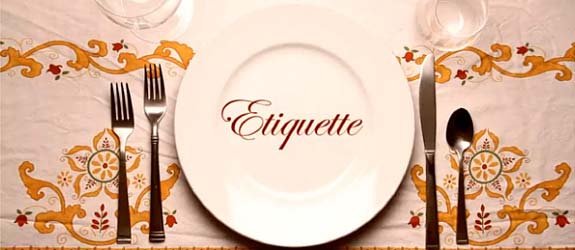Some people claim that etiquette is no longer important, that the rules for good behaviour are old- fashioned and outdated. But on the other hand there are a lot of people who believe that good behaviour and manners never go out of style. Etiquette, just like any other cultural norms, evolve to match the changes in society.
Etiquette can be defined as behaviour that is pleasent and polite in different situations such as professional, social and family circumstances. Etiquette is not innate, it is acquired through a conscious learning of what constitutes decent behaviour. Etiquette is not universal, each society is characterized by its distinct etiquette. What is acceptable in one culture may be unacceptable in another.
But why is etiquette so important? It helps us show respect and consideration towards other and most importantly it helps us form relationships with others. A lapse in etiquette may offend other people. Basic etiquette rules teaches us which fork to use or which dress to wear or what to say in certain circumstances but it also covers much broader issues. One has to keep in mind that politeness works everywhere, all the time.
The most basic rule of etiquette is: When in doubt, treat other people as you want to be treated yourself. But how about dining etiquette? Table manners are not extremely complicated and will surely help you make a good impression at your next meal. If you are sharing a meal with anyone, there are some table manners that everyone should observe. No one wants to sit across the table from someone who chews with his mouth open or waves the utensils around.
Whether you are enjoying a nice dinner with friends or a business lunch with an important client, you need to make sure you behave appropriately.
- Utensils: Learn the proper use of utensils. In most cases, you start using utensils on the outside and then work your way inward.
- Passing food: Always pass food to the right. Heavy dishes are put on the table with each pass. Keep in mind that specific rules apply to passing salt and pepper as well as bread and butter.
- Cell phones: When you dine in a restaurant put your cellphone on silent and if it’s urgent take the call outside. Other diners don’t need to hear about your personal and professional business.
- Stuffing food: Under no circumstance should you stuff food in your mouth or take large bites of food in your mouth. Don’t rush through the meal and pace yourself to finish each course at the same time as the rest of the people you are dining with.
- Grooming: Avoid grooming at the table, it is very unhygienic and rude. If you need to powder your nose, reapply your lipstick or comb your hair always go to the bathroom.
- Paying and tipping: Unless you make other arrangement with the restaurant before, the host or hostess should receive the bill. Be ready to tip. While tipping is mandatory in some countries, such as the United States, some countries are more flexible when it comes to tipping. Generally, the average tip is 15% to 20% of the total meal cost.
- Smoking: Very few restaurants allow smoking however, if you happen to be dining in a restaurant that allows it, never go in between courses. Wait until the meal is over and ask if anyone objects. If not, go ahead.
In today’s society, etiquette serves several important functions. One of the most important functions, is that it provides people with personal security. When people know how to behave appropriately in any situation, it makes them feel more comfortable. Apart from that, etiquette protects feeling of others and makes others feel comfortable. Keep in mind that etiquette rules should serve as guidelines, and not a set of strict set of rules set in stone.
